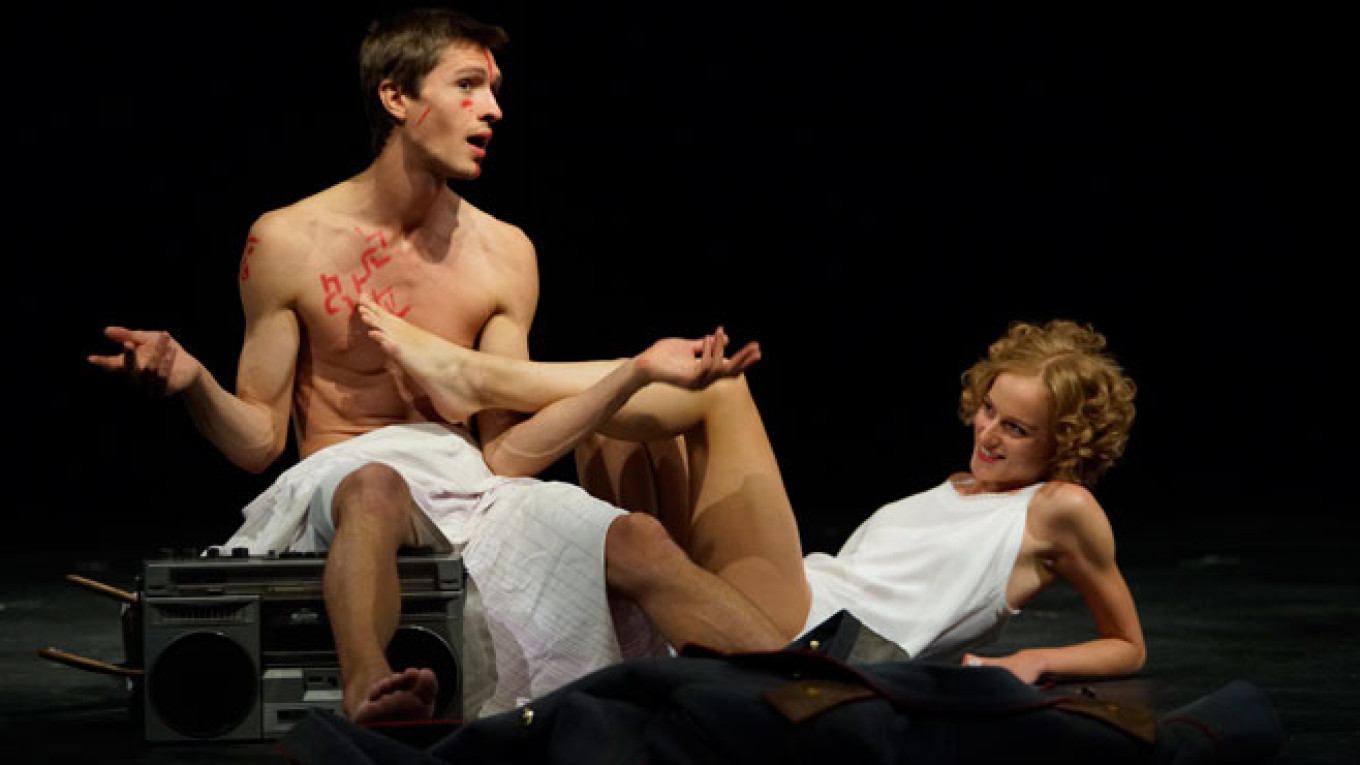As much as one might have wished, Olga Mukhina's long-awaited return to the Fomenko Studio with her new play "Olympia" is not quite the stuff of fairy tales.
Mukhina gave this theater, now one of Russia's most popular, a huge kick-start in 1996. Her first major play, "Tanya-Tanya," was the young venue's seventh production, but it was its first foray into contemporary drama. It was only the third show produced since the actors in the young company graduated from the Russian Academy of Theater Arts, and it came on the heels of a big box-office failure, Alexander Blok's "The Puppet Booth," which played only four times in Moscow.
"Tanya-Tanya" was a resounding success. Its dreamy irony and contemporary wit suited the young actors beautifully. It put the Fomenko Studio back on track and proclaimed the appearance of a major new writer.
Not surprisingly Mukhina wrote her next play, "YoU," expressly for the theater. Which is when things went crooked.
Fomenko — whom I once heard say, "I don't understand the Mukhina phenomenon" — chose not to stage "YoU." The same thing happened when Mukhina wrote her next play, "Flying" in the mid-2000s.
In a perfect world, Mukhina would have been to the Fomenko Studio what Anton Chekhov was to the Moscow Art Theater. In the real world, the Fomenko Studio turned its back on the writer who gave it its first professional hit.
Still, thanks to Yevgeny Kamenkovich, a staff director under Fomenko who became artistic director following the master's death in 2012, Mukhina never drifted too far away. Kamenkovich mounted excellent student productions of "YoU" and "Flying" for the studio, and he commissioned the writing of "Olympia."
When star actor Yevgeny Tsyganov chose to stage "Olympia" on the Fomenko's main stage, it looked like historical justice was about to be done.
But as I say, this is no fairy tale, and real life is impossible to pin down in just a few words, no matter how well-intentioned they may be.
"Olympia" is a hugely ambitious play that attempts to tell the story of Russia over the last 40 years. It begins in a Soviet apartment where a speech by Leonid Brezhnev resounds throughout the rooms, and it ends somewhere near the present on a mountaintop where, one suspects, we witness a meeting between a grandson and his grandmother either in the afterlife or in the young man's imagination.
The journey from the first location to the last allows us to encounter details from several eras in a nation's life — a boy's first bottle of Fanta, his first serious fight with his father, his first adult encounters with drugs, sex, love and corruption. Brought up in the strict home of a famous Soviet athlete, the young man grows up to be something of a lackey in a society full of thugs.
The one constant in his life is his grandmother, a cautious woman for whom love and understanding are always guiding lights. Yekaterina Vasilyeva plays her with an endearing surfeit of grandmotherly affection.
As the young man Alyosha, Ivan Vakulenko taps into a purity that is not entirely eclipsed even when his life hits rock bottom. Whether that is enough to save him is another question.
Overall, Tsyganov applied a kind of caricatural approach to this romp through the decades. With design by Vladimir Maximov and Yegor Fedorichev, his production looks as kitschy in the 1970s as it does in the gangster-ridden 1990s, thus making it hard at times to connect to the story.
In all, this production doesn't so much aim to explore and make sense of what has happened in Russia since the 1970s, but rather to provide a series of scenes that comfortably remind us that such events once occurred. That may disappoint some who value the depth of Mukhina's work.
On the other hand, "Olympia" has great sentimental pull. That is verified by the frequency with which laughter and applause interrupt the performance. It may not be the great homecoming that many — including this author — hoped for, but it's good to see this theater and this writer reconnecting. Critics be damned, they should make it a habit.
"Olympia" plays Monday and Tuesday, and Dec. 3, 11 and 28 at 7 p.m. at the Fomenko Studio, located at 29 Naberezhnaya Tarasa Shevchenko. 499-249-1921. Metro Kutuzovskaya. Running time: 2 hours, 30 minutes.
Contact the author at artsreporter@imedia.ru


